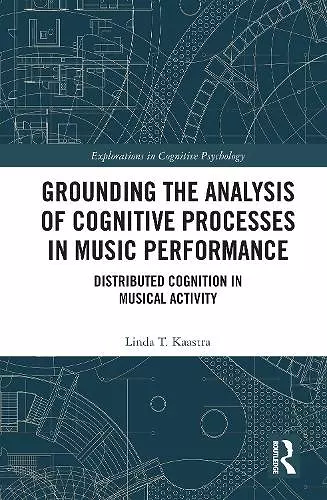Grounding the Analysis of Cognitive Processes in Music Performance
Distributed Cognition in Musical Activity
Format:Hardback
Publisher:Taylor & Francis Ltd
Published:26th Oct '20
Currently unavailable, and unfortunately no date known when it will be back
This hardback is available in another edition too:
- Paperback£41.99(9780367568641)

Through the systematic analysis of data from music rehearsals, lessons, and performances, this book develops a new conceptual framework for studying cognitive processes in musical activity.
Grounding the Analysis of Cognitive Processes in Music Performance draws uniquely on dominant paradigms from the fields of cognitive science, ethnography, anthropology, psychology, and psycholinguistics to develop an ecologically valid framework for the analysis of cognitive processes during musical activity. By presenting a close analysis of activities including instrumental performance on the bassoon, lessons on the guitar, and a group rehearsal, chapters provide new insights into the person/instrument system, the musician’s use of informational resources, and the organization of perceptual experience during musical performance. Engaging in musical activity is shown to be a highly dynamic and collaborative process invoking tacit knowledge and coordination as musicians identify targets of focal awareness for themselves, their colleagues, and their students.
Written by a cognitive scientist and classically trained bassoonist, this specialist text builds on two decades of music performance research; and will be of interest to researchers, academics, and postgraduate students in the fields of cognitive psychology and music psychology, as well as musicology, ethnomusicology, music theory, and performance science.
Linda T. Kaastra has taught courses in cognitive science, music, and discourse studies at the University of British Columbia (UBC) and Simon Fraser University. She earned a PhD from UBC’s Individual Interdisciplinary Graduate Studies Program.
"An ambitious range of ideas flows through six chapters, moving outwards from the micro to the macro: from a person-instrument system, informational resources in musical activity, small ensemble, to the orchestra as a cognitive system where Kaastra lays the landscape for future research. […] The strength of Kaastra’s book relies on her effective analyses of selected case studies, grounded in an array of theories and methodologies based on a combination of methodological measures. [The] book will be of particular interest to early researchers in the fields of cognitive psychology, music psychology, and performance science. Additionally, it offers insights into the learning and understanding of music, with applications for music education. An original investigation, this book comes recommended."
-- Francesca Carpos, Bassoonist, Professor, and Founding Member of the Institute for Social Impact Research in the Performing Arts, Guildhall School of Music and Drama, UK
"An ambitious range of ideas flows through six chapters, moving outwards from the micro to the macro: from a person-instrument system, informational resources in musical activity, small ensemble, to the orchestra as a cognitive system where Kaastra lays the landscape for future research. […] The strength of Kaastra’s book relies on her effective analyses of selected case studies, grounded in an array of theories and methodologies based on a combination of methodological measures. [The] book will be of particular interest to early researchers in the fields of cognitive psychology, music psychology, and performance science. Additionally, it offers insights into the learning and understanding of music, with applications for music education. An original investigation, this book comes recommended."
-- Francesca Carpos, Bassoonist, Professor, and Founding Member of the Institute for Social Impact Research in the Performing Arts, Guildhall School of Music and Drama, UK
"Grounding the Analysis of Cognitive Processes in Music provides a carefully developed theoretical starting point for empirical investigations of the perceptual connections that are grounded in the embodied nature of musical action and experience. Kaastra’s framework of distributed cognition in music-making is first explored at the micro level, through a detailed analysis of instructional videos by professional bassoonists. The case studies demonstrate particularly vividly the everyday and taken-for-granted techniques of practice that constitute the craft of performance. Kaastra […] is unique in her focus on the bassoon, arguably one of the most intriguing and cognitively rich of the orchestral instruments, and I found this section of the book particularly fascinating. Widening the focus beyond body-instrument interaction to include the role of notation, the second case study […] engages with a range of guitar notations (including western notation, TAB, and less formal sketches by practitioners), arguing for moving beyond thinking about notation not as a fixed and abstract representation of musical knowledge, but a cognitive artifact that maps out and invites different kinds of actions. Understanding the ways in which performers coordinate their musical actions remains an important theoretical and empirical challenge, and Kaastra is rigorous in the level of detail in her analysis. The third case study demonstrates that rather than presenting an achievement of each player obeying an external abstract structure provided by the score, temporal unison is co-created in performance […].
The book concludes by suggesting ways in which the framework can be scaled up or down, and in particular, how it might be deployed to analyze the dynamics and mechanisms of an orchestra. Her approach here is valuable in challenging previous models of distributed creativity in orchestral performance which have ascribed creative leadership to the conductor […]"
-- Emily Payne, Editor, Music & Science
ISBN: 9780367151928
Dimensions: unknown
Weight: 453g
164 pages